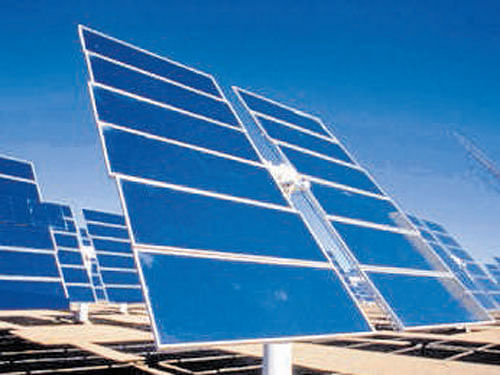
With the summer just a couple of months away, the Bengaluru Electricity Supply Company Ltd (Bescom) is laying thrust on solar energy.
It wants government buildings to generate and consume solar energy so as to reduce the power demand in the summer.
Though Bescom officials insist that there are sufficient resources to meet the summer demand, sources say the utility is resorting to unscheduled load-shedding in the guise of maintenance works to conserve power for the summer.
“The maximum morning and evening peak load in Bengaluru during the winter is 4,300 MW. If the demand during the summer is within 4,300 MW, there will be no problem. But if the demand exceeds that, we will have to buy power,” K Siddaraju, director (technical), Bescom, told DH.
To address the shortage, Bescom hopes that from April 2017 onwards, most government buildings will start generating solar power so that pressure on the grid is reduced, he added.
The Energy Department has invited tenders for installing solar panels of at least one MW capacity in state and Central government buildings under the Integrated Power Development Scheme (IDPS) and the 13th Finance Commission.
Presently, only 30 MW to 40 MW of solar power is generated in all Bescom divisions, and just 6 MW from 448 connections in Bengaluru. This is a small number. Wind power generation is uncertain and ranges from 30 MW to 1,800 MW, the official said.
In the first phase, Bescom has identified 83 state and 200 Central government buildings in all its divisions for installation of solar panels.
In Bengaluru, all Bescom offices, Vidhana Soudha, Vikasa Soudha, Legislators’ Home, Central government offices and schools and panchayat offices have been listed.
Bescom is buying power from various sources and has left hydel resources untouched so as to use them during the summer.
“We are purchasing
600 MW under the short-term open access. Another 450 MW is being purchased from Jindal Power Ltd and other power-trading corporations. We have procured 300 MW from Maharashtra; Bescom’s share in it is 47.9%. We have also signed agreements with sugar factories for power generation which will start in a week. Water resources are being conserved to the maximum. The present capacity of hydel power is 15 million units against the installed capacity of 40 million units,” Siddaraju said.